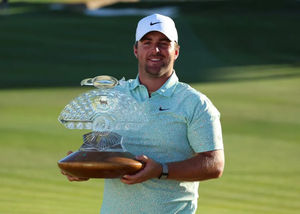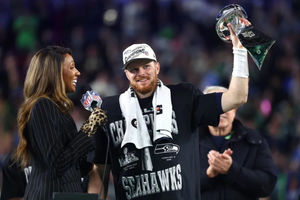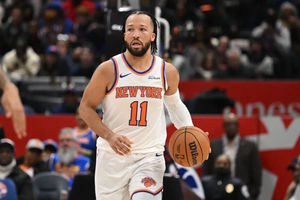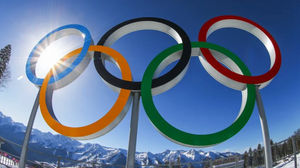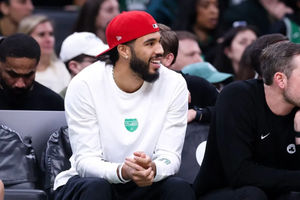A History of Athletes Turned Politicians
 Former Governors Jesse ‘The Body” Ventura, a one-time pro wrestler, and Arnold Schwarzenegger, who got his start as a bodybuilder. credits: | source: Getty Images
Former Governors Jesse ‘The Body” Ventura, a one-time pro wrestler, and Arnold Schwarzenegger, who got his start as a bodybuilder. credits: | source: Getty Images Sports and politics are two worlds that have always been intertwined. Moses Fleetwood Walker’s first game with the Toledo Blue Stockings pushed him to become the first Black player in Major League baseball — 63 years before Jackie Robinson — but that didn’t come without a hard-fought battle and push to get him on the field.
Sports figures have also used their platform to push off-the-field matters of politics. From Olympians Tommie Smith and John Carlos, to the Detroit Tigers’ Willie Horton, to Muhummad Ali, to Colin Kaepernick, all of these athletes during their prime engaged in their respective protests to put pressure on their leagues — and on the public — to wake up and pay attention to vital causes.
Many athletes have also used their platform and celebrity to enter the political arena.
The latest example is former Auburn Head football coach Tommy Tuberville, who notched a victory this week against former Attorney General Jeff Sessions in a Republican Alabama U.S. Senate primary.
Here’s a look at other sports figures to win elected office.
 credits: | source: Getty Images
credits: | source: Getty Images Colin Allred
Allfred, a former linebacker at Baylor University, went on to spend four seasons with the Tennessee Titans between 2006 and 2010.
 credits: | source: Getty Images
credits: | source: Getty Images Colin Allred
Allred became involved in politics in 2017, running as Democrat for Texas’ 32nd Congressional seat. The district covers north Dallas and its northeast suburbs. The congressional district at the time was occupied by 20-year Republican incumbent Pete Sessions. Because Hillary Clinton won the district in 2016’s presidential race, it was seen as a toss-up.
Allred would upset Sessions with 52 percent of the vote. Last year he voted for both articles of impeachment against President Trump. He also endorsed Julian Castro for president during the 2016 Democratic primary.
 credits: | source: AP
credits: | source: AP Dave Bing
Bing is a former NBA guard who played for the Detroit Pistons, Washington Bullets, and Boston Celtics. He was the league’s scoring champion in 1968 and a seven-time All-Star.
 credits: | source: Getty Images
credits: | source: Getty Images Dave Bing
In a special election in 2008 Bing, decided to throw his hat into politics, running for Mayor of Detroit. He bested interim mayor Kenneth Cockrel, Jr. who had risen to that seat due to former mayor Kwame Kilpatrick’s legal trouble.
When Bing took over, Detroit was in hot water financially. The auto industry going under during his tenure, which tied his hands as mayor.
Bing was elected largely because of his business interest in steel supply, but the city was $14 billion in debt, and had a $327-million budget deficit. He spent much of his first year in office trying to convince everyone around him the city was in big trouble.
By 2013 Detroit filed for bankruptcy and Bing did not run for reelection.
 credits: | source: AP
credits: | source: AP Bill Bradley
Bradley is a two-time NBA champion with the New York Knicks, playing for the team from 1967-1977. He earned a gold medal on the U.S. Olympic team in Tokyo in 1964.
 credits: | source: Getty Images
credits: | source: Getty Images Bill Bradley
In the summer of 1977, just as his basketball days were coming to an end, he ran for Senate in New Jersey as a Democrat and won. Known as a policy wiz, in 1986 he completely overhauled the tax code.
He created an Earned Income Tax Credit which at the time abolished tax loopholes. In 1987 he sponsored a bill to return millions of acres to the Black Hills of South Dakota to the Sioux tribe which were illegally taken by President Ulysses S. Grant.
Bradley eventually ran for president in 2000, losing to Al Gore in the primary.
 credits: | source: AP
credits: | source: AP Jim Bunning
Bunning was a right-handed pitcher for the Detroit Tigers, Philadelphia Phillies, Pittsburgh Pirates and Los Angeles Dodgers from 1955 to 1971. He was one of the best pitchers of his day to take the mound, with two key milestones: a no-hitter on July 20, 1958, and a perfect game on Father’s Day in 1964. Bunning also boasted over 100 wins in both the NL and AL. He was inducted into the Baseball Hall of Fame in 1996.
Throughout the ‘60s, he was instrumental in laying the groundwork for the success of MLB’s labor union, one of the strongest in the country.
 credits: | source: Getty Images
credits: | source: Getty Images Jim Bunning
He entered public service in 1977 as a City Council member in Fort Thomas, Ky. Two years later he ran for Kentucky Senate and was elected Republican Majority Whip, a rare distinction for a freshman legislator. A few years later he ran for governor of Kentucky, but lost to Martha Layne Collins.
In 1986, Bunning ran for Kentucky’s fourth Congressional seat, considered the state’s most conservative district at the time. He won and was re-elected five times before leaving the office to take a Senate seat in 1998. He was outspoken on investigations into baseball’s steroid use, and on matters of illegal immigration. In April 2006, Timemagazine called Bunning one of America’s Five Worst Senators.
He retired in 2010. Rand Paul holds his former seat.
 credits: | source: Getty Images
credits: | source: Getty Images Anthony Gonzalez
Gonzalez was the 32nd overall pick in the 2007 NFL draft. The wide receiver spent five years in the league, split between the Indianapolis Colts and the New England Patriots.
 credits: | source: Getty Images
credits: | source: Getty Images Anthony Gonzalez
In 2018, he took a swing at politics, running as a Republican for Ohio’s 16th Congressional district seat, which covers the Cleveland and Akron suburbs. He became the first Latino to represent Ohio in Congress, receiving donations from Peyton Manning, Austin Collie, Kirk Barton, and Cleveland Browns owner Jimmy Haslam.
 credits: | source: AP
credits: | source: AP Kevin Johnson
Johnson was a point guard for the Cleveland Cavaliers and Phoenix Suns from 1987 to 2000. He was the 7th overall pick in the 1987 draft and a three-time NBA All-Star.
 credits: | source: Getty Images
credits: | source: Getty Images Kevin Johnson
In 2008 he announced his bid for Mayor of Sacramento. He went on to beat incumbent Heather Fargo in a run-off, claiming 57 precent of the vote.
He started nine initiatives during his first term as mayor, primarily to address economic disparities among marginalized groups, specifically African-Americans in the city.
Johnson faced a slew of sexual allegations dating back to the mid 1990’s — before he ran for public office. Phoenix police in 2015 released a 1996 phone recording of Johnson and an underage girl who accused him of molesting her at her home two decades prior. Johnson has denied the allegations and prosecutors never brought charges against him. According to HBO, Johnson’s accuser signed an NDA and he reportedly paid her $230,000 to stay quiet during his 2008 Sacramento mayoral bid.
He was also accused of sexual misconduct with a student in 2007 at St. Hope High School in Sacramento, but charges were never brought by the district attorney. The teacher that raised the student’s complaint to authorities said the school worked to “ intimidate its students through legal interrogation.”
Johnson’s lawyer reached out to the victims, before authorities were able to get involved, and questioned their allegations. The accusations were later recanted and charges were not brought.
Johnson won reelection in 2012.
 credits: | source: AP
credits: | source: AP Steve Largent
One of the NFL’s most prolific receivers, Largent was drafted in the fourth round by the Houston Oilers in 1976. He was later traded to the Seattle Seahawks and spent 14 seasons with the team, making seven Pro Bowls. When he retired in 1992 Largent held just about every receiving record, including most catches (819), receiving yards (13089) and receiving touchdowns (100).
 credits: | source: Getty Images
credits: | source: Getty Images Steve Largent
Largent ran for Oklahoma’s 1st Congressional District in 1994 and won, earning re-election three consecutive times. As a freshman Republican he aligned himself with the “Conservative Christian” vote.
Largent went on to run for governor of Oklahoma in 2002 where he would garner the Republican nomination but would lose in the general election by 7,000 votes.
 credits: | source: AP
credits: | source: AP Bob Mathias
Mathias played fullback at Stanford before going on to become an Olympic Gold medal decathlete. He competed at the 1948 London games and 1952 Helsinki games, winning gold in both.
 credits: | source: AP
credits: | source: AP Bob Mathias
Mathias first ran for the House of Representatives in 1967 in California’s Northern San Joaquin Valley. He was a strong candidate because of his name recognition.
He was a self-described fiscal conservative who served four consecutive terms in office.
“Probably the toughest part was getting used to going from sports, where everyone likes you ... to politics, where if 51 percent of the people like you, you can stay in office,” said Mathias of his eight years in Washington D.C.
“In that world, people stomp on you and say bad things about you.”
He died of cancer in 2006.
 credits: | source: AP
credits: | source: AP Tom Osborne
Osborne won three National Championships as head coach of the Nebraska Huskers. He spent 23 seasons leading the football program, and most of that time he was also the assistant athletic director. His program, while successful on the field, had countless scandals and players were routinely in trouble with the law.
 credits: | source: Getty Images
credits: | source: Getty Images Tom Osborne
He left the school in 1998 and two years later made the jump to politics, running for Nebraska’s 4th Congressional District. He spent much of his life living in the area before moving to Lincoln, Neb., which is roughly 287 miles away, to coach. He ran as a Republican in a deep-red district, garnering more than 80 percent of the vote, but was known as a moderate.
Osborne strongly opposed sports gambling, explaining his reasoning earlier this year to the Omaha World-Herald: “Most of the really unpleasant interactions I had with fans were people who had lost a bet.”
In 2006 he ran for Governor of Nebraska but lost in the Republican primary.
 credits: | source: Getty Images
credits: | source: Getty Images Manny Pacquiao
Pacquiao was a professional boxer who made history as the first to ever win world titles in eight weight divisions. He finished his career 62–7–2 as a professional, with 39 wins by knockout.
 credits: | source: Getty Images
credits: | source: Getty Images Manny Pacquiao
He took his first shot at politics running for a House seat in his home country, the Philippines, as a Liberal Party candidate for the 1st District of South Cotabato in 2007. He would lose to incumbent lawmaker Darlene Antonio-Custodio.
Many at the time had a hard time imagining Pacquiao as a politician. “He probably wasn’t really prepared for politics, but more than anything, I think, people weren’t prepared to lose him as their boxing icon either,” Antonio-Custodio said at the time.
In 2009, he ran again and won, claiming a seat in his wife’s Jinkee’s home district. In 2013 he was re-elected and his wife, Jinkee, was elected as vice-governor of Sarangani.
In 2015 he won a Senate seat. He is currently the Chair of the Senate Public Works Committee. In the past he has endorsed U.S. politicians such as Nevada Sen. Harry Reid. Pacquiao has supported the death penalty for drug traffickers.
 credits: | source: Getty Images
credits: | source: Getty Images Heath Shuler
As a quarterback at Tennessee, Shuler was a 1993 Heisman runner-up behind Florida State’s Charlie Ward. The third pick overall in the 1994 draft, Shuler went on to play five years in the NFL for Washington, New Orleans, and Oakland.
 credits: | source: Getty Images
credits: | source: Getty Images Heath Shuler
In 2006, he ran as Democrat for North Carolina’s 11th Congressional District —which, at the time, was held by eight-term Republican Charles H. Taylor. Shuler criticized Taylor’s voting absence for the Central Free Trade Agreement, which Shuler felt was a disservice to the district. At the time, Taylor was opposed to it.
Shuler went on to win the seat that November, serving three terms. Shuler is a gun-rights advocate, and after Rep. Gabrielle Giffords was shot in her home district in Arizona in 2011, he told the Washington Post, “You never think something like this will happen, but then it does.”
Shuler added: “After the elections, I let my guard down. Now I know I need to have [my gun] on me. We’re going to need to do a much better job with security at these events.”
 credits: | source: AP
credits: | source: AP Arnold Schwarzenegger
Schwarzenegger was a renowned bodybuilder known as “The Austrian Oak.” He competed in powerlifting competitions internationally for 15 years, winning 90 percent of the competitions he entered.
He left the bodybuilding world and jumped straight into acting, becoming one of Hollywood’s most bankable stars thanks to such films as The Terminator series, Predator, Twins, and Batman and Robin, to name a few.
 credits: | source: Getty Images
credits: | source: Getty Images Arnold Schwarzenegger
Schwarzenegger’s foray into politics began with the George H.W. Bush administration, where he served as chairman of the President’s Council on Physical Fitness and Sports (1990-93). He went on to serve as a Red Cross ambassador in 1993-94.
In 2003 he ran as a Republican for Governor of California, stating during a notable 2004 Republican National Convention that America’s Democratic Party reminded him of Austrian socialists.
Throughout his campaign he faced allegations of sexual and personal misconduct, with six women giving personal testimonies of abuse. Schwarzenegger responded: “Looking back, I stepped over the line several times, and I was the first one to say sorry,” he told Men’s Health magazine in 2003.
Undeterred by scandal, Schwarzenegger served as governor of the state from 2003 to 2011, positioning himself as the guy who wanted to get rid of political “gridlock”. One of his first decisions in bridging both parties in the state was when he turned against the advice of Republican strategists to appoint Democrat Susan Kennedy as his Chief of Staff.
He was considered a centrist when it came to his political ideology sat — not raking in huge support from either party because he raised taxes, but also cutting the state’s education, health and social budget. He left office with a 22 percent approval rating after pushing the state into a $28 billion deficit.
 credits: | source: AP
credits: | source: AP Jesse Ventura
Ventura served in the Navy in the early ’70s, fighting in the Vietnam War, before making his professional wrestling debut as the widely popular Jesse “The Body.” He’s most known for his three world title fights against reigning champ Hulk Hogan, losing all of them. In 1984 he retired from the sport due to blood clots, a byproduct of his exposure to chemicals while fighting in Vietnam.
Ventura would return to the ring but would soon transition to a wrestling commentary role on television, where he received his own segmenton WWF’s Superstars of Wrestling, called “The Body Shop.”
He went on to a movie career in the late ’80s, acting in The Running Man, Batman and Robin, and Predator.
 credits: | source: AP
credits: | source: AP Jesse Ventura
Ventura stepped into the political ring in 1991, winning election as Mayor of Brooklyn Park, Minn. Seven years later he ran for governor of Minnesota, winning as a Reform candidate.
His thoughts on the two major parties in the U.S. in 1999? “Monsters that are out of control,” only concerned with “their own agendas, and their pork.”
He was criticized in office for mishandling the state’s budget. When Ventura left office in 2003, Minnesota had a $4.2 billion budget deficit. In 1999, the state had enjoyed a $3 billion surplus.
 credits: | source: AP
credits: | source: AP J.C. Watts
Watts was a standout quarterback for the Oklahoma Sooners in the late 1970s, leading them to two consecutive Orange Bowl victories. He spent a few years in the Canadian Football League.
 credits: | source: Getty Images
credits: | source: Getty Images J.C. Watts
Watts served in that seat for eight years, posturing himself at the time as a stark conservative who voted for the federal death penalty and opposed both abortion and gay rights. After his time in Congress, he served in a number of roles in President George W. Bush’s Cabinet, at one point coming out with a dubious statement, given the United States’ history, in support of the Iraq War.
“America did not become the leader of the free world by looking the other way to heinous atrocities and unspeakable evils,” Watts said in 2003.
Since 2008, Watts has been vocal about the failings of the Republican Party to address the needs of the Black community. In 2019 he began the launch of a decades-long project, The Black News Channel, which he says is designed to serve African-American needs.
“I do think you have other news sources that will have African-American faces on their programs, but they don’t have content that is culturally specific to the African-American community,” Watts told The Roll Call earlier this year. “By no means am I being hostile to them, it’s just a reality.”
Related
The NBA’s Tanking Problem Is Getting Worse — Not Better
NBA Picks Tonight: Three Best Bets Before the All-Star Break
The Biggest Question Facing Every 2026 MLB Contender
Best NBA Betting Picks for Wednesday Feb. 11th Slate
- Early Super Bowl LXI Odds Favor Seahawks, Sleeper Betting Picks & More
- Sunday Feb 8th NBA Picks: Three Best Bets Today
- Super Bowl Betting Preview: Seahawks vs. Patriots Breakdown & Pick
- The Most Fun Super Bowl Prop Bets You Can Make This Year
- Super Bowl 60 Prop Bets: 10 Best Bets for Patriots vs. Seahawks
- UFC Fight Night at the Apex Best Betting Picks and Predictions
- NBA Betting Picks for Friday Feb. 6: Post-Deadline Predictions







